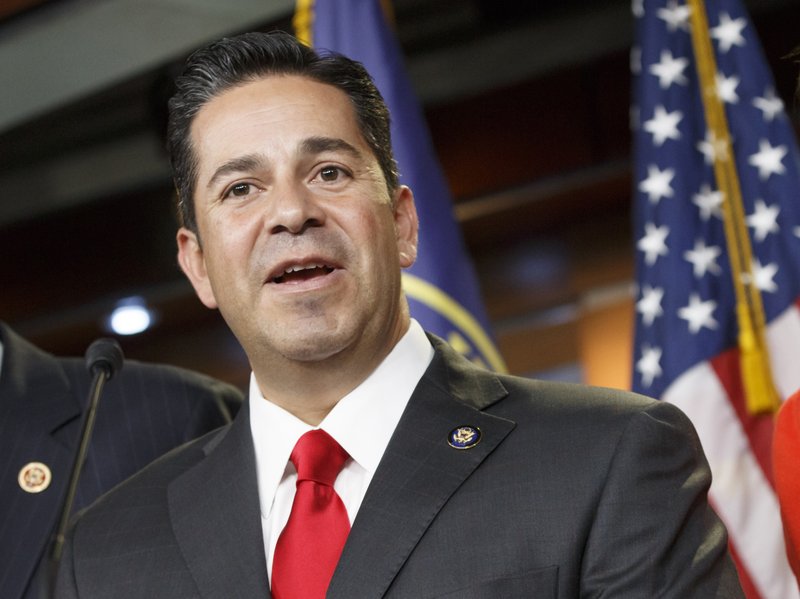WASHINGTON -- House Democrats have run national TV spots in which actors recount Donald Trump's remarks about immigrants, women and veterans and one asks, "How can Republican members of Congress support that?"
RELATED ARTICLES
http://www.arkansas…">Clinton, Trump tout vets' backing http://www.arkansas…">GOP pursuing Clinton inquiry on erased emails
FULL ELECTION COVERAGE
The commercials, by the Democratic Congressional Campaign Committee, underscore the party's hopes for an Election Day crop of new House seats, fueled by the GOP presidential candidate's comments.
Outnumbered by Republicans 247-188, Democrats are working to grow their ranks in November, but gaining the 30 seats needed to capture a House majority appears elusive.
Of the House's 435 seats, only about 40 across the country are viewed as competitive.
Redistricting, along with Democrats' tendency to be concentrated in urban and coastal areas, has given both parties' incumbents such sturdy protection that on Election Day in 2014, just 13 of 388 lawmakers seeking re-election lost. Of the 435 House members elected, 377 won by a decisive 10 percentage points or more or were unopposed.
In the 17 presidential election years since World War II, a party has gained 30 House seats just three times, most recently in 1980.
Democrats' predictions have been tempered. Rep. Ben Ray Lujan, D-N.M., who heads the House Democrats' campaign committee, said, "Democrats are on offense and we'll pick up seats."
Democrats failed to recruit strong candidates in districts where they might have competed.
Frederick LaVergne, the Democratic challenger against well-financed freshman Republican Rep. Tom MacArthur in central New Jersey, has reported $600 cash on hand. The party has had problems fielding candidates in the Philadelphia suburbs, eastern Ohio, central Illinois and west of Detroit.
"They haven't put seats in play they needed to put in play," said Rep. Steve Stivers, R-Ohio, a top member of the National Republican Congressional Committee.
Thanks to strong off-year elections in 2010 and 2014, the GOP's 247 seats are its high-water mark since Herbert Hoover's presidency 86 years ago.
While 26 House Republicans were elected in 2014 in districts that backed President Barack Obama in 2012, just five Democrats serve in districts carried by 2012 GOP presidential nominee Mitt Romney.
That means more Republicans are at a disadvantage. Among them, Rep. Robert Dold is clinging to a Chicago-area district that gave Obama 58 percent of its vote, more than in any other Republican-held seat.
Trump is unpopular among women, minority groups and college-educated voters. This spells trouble for Republicans representing suburbs and districts with many Hispanic voters, and many candidates have criticized his remarks, though few have abandoned him outright.
Freshman GOP Rep. Carlos Curbelo is fighting for re-election in a south Florida district that is two-thirds Hispanic. He's said he won't support Trump and has run a Spanish-language radio ad in which former Florida Gov. Jeb Bush says, "I know Carlos, and I know he will continue representing us with integrity in Washington."
Republican Rep. Mike Coffman, whose suburban Denver district is one-fifth Hispanic, says of Trump in one spot, "Honestly, I don't care for him much."
Republicans argue that Clinton poses problems, too. Polls find much dislike for her, and Republicans are hoping for lower turnout by young liberals who preferred Vermont Sen. Bernie Sanders, Clinton's Democratic presidential rival, and by blacks no longer drawn to vote by Obama.
Should Trump's defeat appear inevitable, House Republicans could cast themselves as a brake on an administration run by Clinton. So far, they've used that sparingly.
One GOP fundraising email signed by House Speaker Paul Ryan, R-Wis., says, "I worry about what will happen if Hillary Clinton is elected president."
A Section on 09/07/2016
